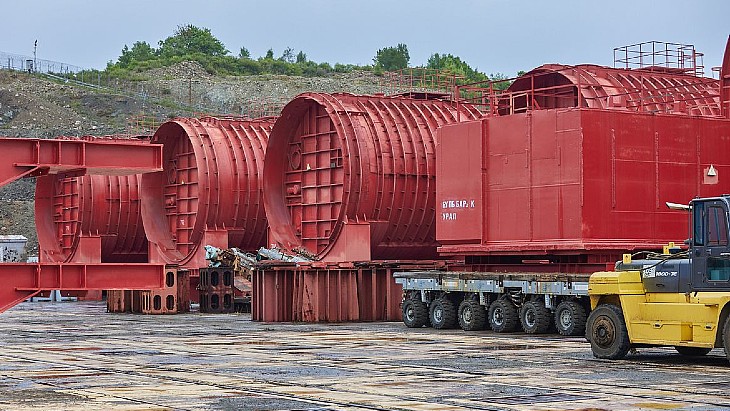UK considers uranium and plutonium stocks
Wednesday, 4 July 2007
The document, entitled Uranium and Plutonium: Macro-economic Study, and prepared by consultants Environmental Resources Managment and Integrated Decision Management, totals up the UK stockpiles resulting from nuclear fuel cycle activities before putting forward a range of scenarios for their long-term management.
The NDA has the responsibility of managing the legacy of the UK's historic nuclear program, gaining the best value for the taxpayer. It will use information from the report to discuss the future management of uranium and plutonium with government.
The report explains that at present the materials are financially accounted for as "assets of zero value" which could be considered as either an asset or a liability depending on a variety of factors including the uranium market price and the relative costs of treating them as waste, storing them, or of processing them for sale on the market in one form or another.
In summary, the three long-term managment options discussed in the report are:
Analysis in the report showed that the re-use option could yield enough nuclear fuel to power three pressurized water reactors of about 1000 MWe for their entire 60-year lifespans. The existing stocks of uranium and plutonium would also be enough to power a 12 GWe FBR fleet for 700 years.
In terms of discounted costs, the quick disposal option would cost around $2 billion; Long-term storage would cost around $0.6 billion; And the economics of a quick re-use as fuel vary from a cost of $2 billion to an income of $4 billion.
The report notes that it is outside its scope to make recommendations: "recommending options should follow an integrated, transparent decision-making process conducted by the NDA, government, regulators and other stakeholders."
It concludes: The 'waste' option is low-risk and low cost. If the uranium price is low, it could even has the lowest cost of all. The 'store' option is flexible and puts off large capital expenditure for significant periods. The 'use' option could realise significant value from the materials (particularly if the uranium price is high) but is subject to significant downside risks.
Further information
Nuclear Decommissioning Authority
WNA's Nuclear Power in the United Kingdom information paper
The UK has enough uranium and plutonium in stock tofuel three 1000 MWe reactors for their entire 60-year lives, a reporthas told the Nuclear Decommissioning Authority, which will discuss management of the materials with government.
The UK has enough uranium and plutonium in stock to fuel three 1000 MWe reactors for their entire 60-year lives, a report has told the Nuclear Decommissioning Authority.The document, entitled Uranium and Plutonium: Macro-economic Study, and prepared by consultants Environmental Resources Managment and Integrated Decision Management, totals up the UK stockpiles resulting from nuclear fuel cycle activities before putting forward a range of scenarios for their long-term management.
The NDA has the responsibility of managing the legacy of the UK's historic nuclear program, gaining the best value for the taxpayer. It will use information from the report to discuss the future management of uranium and plutonium with government.
The report explains that at present the materials are financially accounted for as "assets of zero value" which could be considered as either an asset or a liability depending on a variety of factors including the uranium market price and the relative costs of treating them as waste, storing them, or of processing them for sale on the market in one form or another.
In summary, the three long-term managment options discussed in the report are:
- To treat the materials as waste, put them in a form suitable for geologic disposal and proceed with this as soon as possible.
- To store the materials for the long-term on the assumption that they may have a value at some point up to 300 years in future.
- To use the materials now as fuel, assuming a certain current market value for them. This would see uranium stocks put back into enrichment and fuel fabrication and plutonium used as an input to mixed-oxide fuel (MOX).
| THE UK STOCKPILE
In addition there are various quantitites of low- and high-enricheduranium as oxide powders, fluoride powders and uranium metal. These'clusters' amount to approximately around 2000 tonnes*. * Tonnes of heavy metal equivalent (uranium/plutonium) within the materials. |
In terms of discounted costs, the quick disposal option would cost around $2 billion; Long-term storage would cost around $0.6 billion; And the economics of a quick re-use as fuel vary from a cost of $2 billion to an income of $4 billion.
The report notes that it is outside its scope to make recommendations: "recommending options should follow an integrated, transparent decision-making process conducted by the NDA, government, regulators and other stakeholders."
It concludes: The 'waste' option is low-risk and low cost. If the uranium price is low, it could even has the lowest cost of all. The 'store' option is flexible and puts off large capital expenditure for significant periods. The 'use' option could realise significant value from the materials (particularly if the uranium price is high) but is subject to significant downside risks.
Further information
Nuclear Decommissioning Authority
WNA's Nuclear Power in the United Kingdom information paper
Most Read
_17992.jpg)
Moltex reactor can consume used fuel, research confirms
Friday, 4 October 2024
_75800.jpg)
UK opts for disposal of plutonium inventory
Friday, 24 January 2025

Canada selects location for used nuclear fuel repository
Thursday, 28 November 2024

More than 200 Russian nuclear submarines have been dismantled, says Rosatom
Wednesday, 11 September 2024
Podcasts & Features
In Quotes: Bruce Power's James Scongack
Podcasts & Features Thursday, 17 April 2025
A guide: Uranium and the nuclear fuel cycle
Podcasts & Features Monday, 7 April 2025






_88592.jpg)

